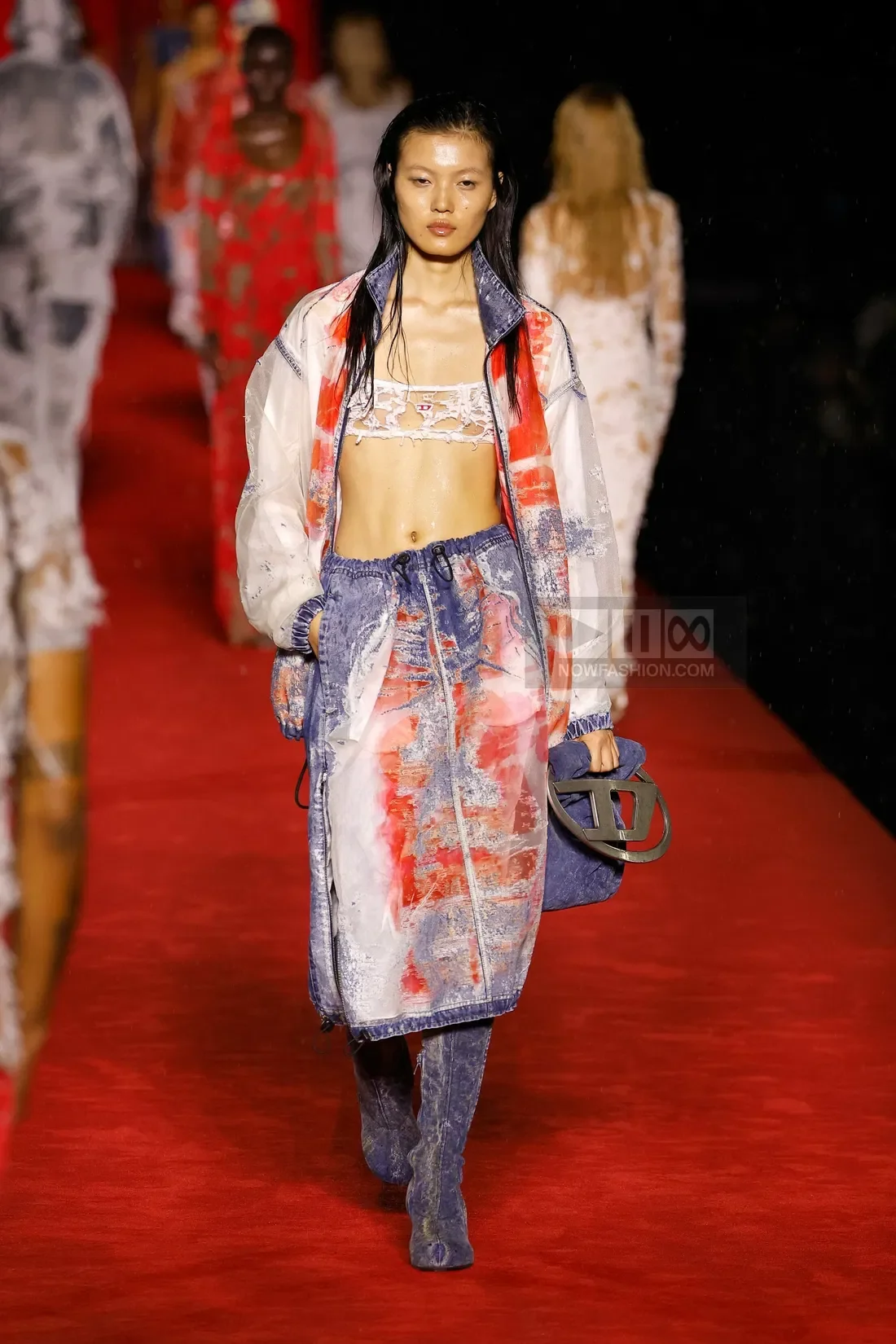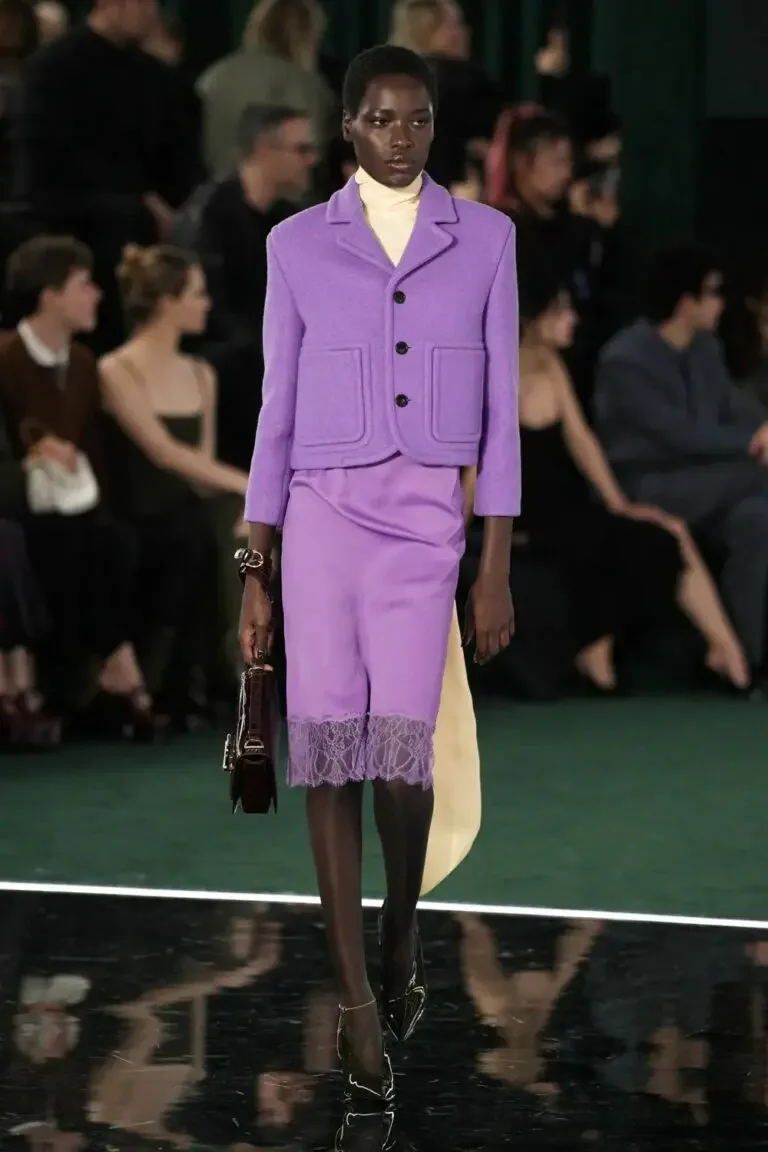Milan Fashion Week 2025: Gucci’s Cinematic Reinvention and Diesel’s Spectacle
Milan Fashion Week opened with a seismic double-act. Two houses, one of the most powerful in luxury and another deeply embedded in pop culture, set the tone for 2026: Gucci under Demna’s new direction, and Diesel with Glenn Martens’ radical approach. While their strategies diverge, both delivered one clear message: fashion is no longer just about clothes. It’s about identity, culture, and experience at scale.
Gucci: Demna’s Debut and the Power of Cinematic Storytelling
Gucci’s runway calendar debut under Demna was as much a film premiere as a fashion presentation. The designer, long known for his ability to blend irony, provocation, and cultural critique, unveiled his first Gucci vision as a lookbook of Italian archetypes, shot by the celebrated photographer Catherine Opie.
The collection quickly evolved into something larger. On Tuesday, the same characters stepped onto the red carpet, leading into the premiere of The Tiger, a short film directed by Spike Jonze and Halina Reijn. The film featured a cast of Hollywood heavyweights, Demi Moore, Edward Norton, Ed Harris, and Elliot Page, embodying a grotesque family tale that blurred reality and performance (Business of Fashion).
It was a bold move: fashion presented not just as clothing, but as a cinematic universe. Yet critics were divided. Some saw genius in the layering of identities and media, while others questioned whether the clothes themselves minimalist tailoring, exaggerated outerwear, and disjointed references risked being overshadowed by spectacle.
Still, the strategy was unmistakable: Gucci under Demna seeks to seize attention through cultural saturation, a move echoing Alessandro Michele’s tenure, but with a sharper, darker edge. And with pieces hitting stores almost immediately, the true test will be commercial. Will customers buy into this vision? The answer will determine whether Gucci can regain the momentum it lost in recent seasons.
Diesel: Glenn Martens’ Pop Experiment Continues
While Gucci leaned into Hollywood spectacle, Diesel doubled down on immersive disruption. Since joining in 2020, Glenn Martens has transformed Diesel from a fading denim label into one of fashion’s most talked-about houses. His approach blends street culture, viral marketing, and performance art, positioning Diesel as the voice of youth culture within luxury.
For this season, Martens abandoned the conventional runway format. Instead, he staged a city-wide egg hunt across Milan. Massive, glass-like eggs, each large enough to contain a model, were placed in public spaces. Inside, live models showcased looks from the new collection, turning the city itself into a catwalk (BoF).
The concept tapped into the gamification of fashion: a scavenger hunt that invited locals, influencers, and international press to discover Diesel’s world on the streets. It was playful, democratic, and Instagram-ready exactly in line with Diesel’s pop DNA. Martens has consistently argued that fashion should not be confined to front rows, and his Milan stunt exemplified that belief.
Critically, the clothes reflected the label’s edgy spirit: distressed denim, industrial textures, and bold graphics designed for a generation raised on streetwear and spectacle. Diesel’s show reminded the industry that brand engagement today is not about exclusivity, but inclusivity through experience.
The State of Fashion in 2026: Reinvention as Survival
Day One of Milan Fashion Week 2026 underscored an industry in flux. Luxury houses can no longer rely on heritage alone; they must reinvent constantly to stay culturally relevant.
Gucci, still one of Kering’s biggest earners, is betting on Demna’s radical storytelling to revive slowing sales. The house’s gamble is whether audiences will accept a darker, more cerebral Gucci that leans less on romantic maximalism and more on spectacle and provocation.
Diesel, a smaller player, thrives by leaning into experimentation. Martens’ approach positions the brand as both rebellious and forward-thinking, capitalizing on the fact that younger consumers value experience, shareability, and cultural currency over traditional luxury.
Together, Gucci and Diesel illustrate the spectrum of reinvention: one rooted in cinematic mythology, the other in pop-cultural playfulness. Both reflect how fashion in 2026 is no longer a monologue but a multimedia dialogue with its audience.
Why It Matters
The opening day wasn’t just about two collections, it was about the future of fashion storytelling. Milan’s dual showcase suggested a future where:
Narrative is as important as fabric: Luxury houses are building cinematic universes and immersive city experiences, not just collections.
Spectacle is currency: Whether it’s Gucci’s Hollywood short film or Diesel’s street installations, the ability to generate buzz and virality is as crucial as design.
Reinvention is survival: With shifting consumer behaviors, brands that fail to experiment risk obsolescence.
As the rest of Milan Fashion Week unfolds, the tone has been set: expect drama, disruption, and reinvention at every turn.








